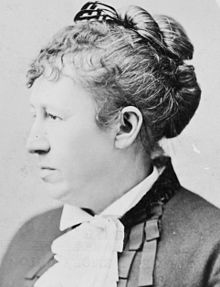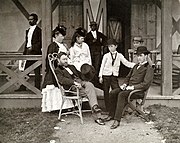Julia Grant
Julia Grant | |
|---|---|
 | |
| First Lady of the United States | |
| In role March 4, 1869 – March 4, 1877 | |
| President | Ulysses S. Grant |
| Preceded by | Eliza Johnson |
| Succeeded by | Lucy Hayes |
| Personal details | |
| Born | Julia Boggs Dent January 26, 1826 St. Louis, Missouri, U.S. |
| Died | December 14, 1902 (aged 76) Washington, D.C., U.S. |
| Resting place | General Grant National Memorial Manhattan, New York |
| Spouse | |
| Children | |
| Signature | |
Julia Boggs Grant (née Dent; January 26, 1826 – December 14, 1902) was the first lady of the United States and wife of President Ulysses S. Grant. As first lady, she became a national figure in her own right.[1] Her memoirs, The Personal Memoirs of Julia Dent Grant were published in 1975.
Early life and education
Julia Boggs Dent was born on January 26, 1826, at White Haven plantation west of St. Louis, Missouri.[2][3] Her parents were Frederick Dent (1787–1873), a slaveholding planter and merchant, and Ellen Wrenshall Dent.[2] Frederick owned about 30 African slaves, whom he freed only when compelled by law, having previously resisted moral arguments against slaveholding.[3]
Julia, a distant maternal relative to Confederate general James Longstreet, was the fifth of eight children.[3] In her memoirs, Julia described her childhood as "one long summer of sunshine, flowers, and smiles…"[4]
Around 1831–1836, Julia attended the Gravois School, a co-educational one-room schoolhouse in St. Louis.[3] From age 10 to age 17, Julia attended the Misses Mauros' boarding school in St. Louis with the daughters of other affluent parents.[4] Julia was a boarding student during the week and returned home to White Haven on weekends.[3]
The Dent family was highly social with visitors coming from among the elite class of Cincinnati, Louisville and Pittsburgh.[3] William Clark (of Lewis and Clark) and politician Alexander McNair were family friends.[3]
As a young woman, Julia was a skilled pianist, an expert horsewoman and a voracious reader of novels.[3]
Strabismus
Julia was born with strabismus (more commonly known as "crossed eyes") which prevents both eyes from lining up in the same direction.[5] When she was younger, one of the best surgeons in the country offered to perform the simple operation that would fix them.[5] Julia was not keen on surgery, however, and declined.[5]
Because her strabismus was never corrected, Julia almost always posed in profile for portraits.
Engagement and marriage to Grant
While a student at West Point, New York, Fred Dent wrote his sister Julia about how impressed he was with a fellow student, Ulysses S. Grant. "I want you to know him, he is pure gold."[3] In 1844, Ulysses S. Grant began visiting the Dent family.[3] In April of that year, Ulysses asked Julia to wear his class ring, as a sign of their exclusive affection.[3] Eighteen-year-old Julia initially demurred.[3] Grant's regiment was then ordered to Louisiana, in preparation for service in the Mexican–American War.[3] Distraught at their separation, Julia had an intense dream, which she detailed to several people, that Grant would somehow return within days, wearing civilian clothes and state his intention of staying for a week.[3] Despite the unlikeliness of the dream, Ulysses did return just as Julia had predicted and the two became engaged.[3]

Neither set of parents were enthusiastic about the match, with her parents doubting his future earnings capability and his parents disliking her father for being a slaveholder.[2] Nonetheless, the engagement held,[1] and Ulysses often sent letters to her, including ones that described his first exposure to the horrors of battle.[6] The couple would not get married until 1848, four years later, once Grant returned from the war.[6] He then was posted to several far-away locations, including Panama and Vancouver Barracks, where she did not accompany him,[3] although he continued to write her.[6] He suffered from loneliness, boredom, and a possible drinking problem, and resigned from the army in 1854.[6]
Over the next few years he tried several business ventures, none too successfully, and friends of hers indicated that she had been unhappy for much of the first decade of their marriage.[1] Meanwhile, she gave birth to four children between the years of 1850 and 1858.[7] In 1860, the family located themselves in Galena, Illinois, where Ulysses worked as a clerk in a store owned by his brother.[6]
With the American Civil War underway, Grant rejoined the Army.[6] During some parts of the war, Julia traveled to be near her husband,[2] something that was unusual at the time.[3] The rest of the time, the two sent letters to each other. While she was careful to preserve his letters to her – which have been published in several forms – none of her letters to him are known to survive, possibly because at some point she destroyed them.[6]
Children

The Grants had three sons and a daughter:[7]
- Frederick Dent Grant (1850–1912) – soldier, public official
- Ulysses Simpson Grant Jr. known as "Buck" (1852–1929) – lawyer
- Ellen Wrenshall Grant known as "Nellie" (1855–1922) – homemaker
- Jesse Root Grant (1858–1934) – engineer
First Lady
This section needs expansion. You can help by adding to it. (October 2023) |
Grant was the first First Lady recorded on film.[3]
Later life

Julia Grant was the first First Lady to write a memoir, though she was unable to find a publisher, and had been dead almost 75 years before The Personal Memoirs of Julia Dent Grant (Mrs. Ulysses S. Grant) was finally published in 1975.

She attended in 1897 the dedication of Grant's monumental tomb overlooking the Hudson River in New York City. She was laid to rest in a sarcophagus beside her husband. She had ended her own chronicle of their years together with a firm declaration: "the light of his glorious fame still reaches out to me, falls upon me, and warms me."[8]
While in Washington, D.C., Julia followed Dolley Madison's lead and acted as a "Queen Mother" figure.[9] She became friends with First Ladies Frances Cleveland, Caroline Harrison, and Edith Roosevelt.[9]
References

- ^ a b c Caroli, Betty (2010). First Ladies: From Martha Washington to Michelle Obama. Oxford University Press. pp. 80–85. ISBN 9780199750634.
- ^ a b c d Bausum, Ann (2016). Our Country's First Ladies. National Geographic Books. p. 57. ISBN 9781426300066.
- ^ a b c d e f g h i j k l m n o p q r "Julia Grant Biography :: National First Ladies' Library". www.firstladies.org. Retrieved 2016-12-05.
- ^ a b "Julia Dent Grant". whitehouse.gov. 2015-01-02. Retrieved 2016-12-05.
 This article incorporates text from this source, which is in the public domain.
This article incorporates text from this source, which is in the public domain.
- ^ a b c "Why Ulysses S. Grant's Wife Always Posed in Profile". Mental Floss. Retrieved 2016-12-05.
- ^ a b c d e f g Schilling, Derick, ed. (Winter 2018). "Letters to Julia". The Civil War Monitor. pp. 40–51, 75, 76, 78.
- ^ a b "First Lady – Julia Grant | C-SPAN First Ladies: Influence & Image". firstladies.c-span.org. Retrieved 2016-12-05.
- ^ "Julia Dent Grant". Gale Biography in Context.
- ^ a b Hendricks, Nancy (2015). America's First Ladies: A Historical Encyclopedia and Primary Document Collection of the Remarkable Women of the White House: A Historical Encyclopedia and Primary Document Collection of the Remarkable Women of the White House. ABC-CLIO. ISBN 9781610698832.
External links
- 1826 births
- 1902 deaths
- 20th-century American women
- 19th-century Methodists
- 19th-century American women writers
- 20th-century Methodists
- 19th-century American memoirists
- First ladies of the United States
- Daughters of the American Revolution people
- Grant family
- People from St. Louis
- Ulysses S. Grant
- American women non-fiction writers
- American women memoirists
- American women slave owners
- American slave owners
- Memoirists from Missouri
